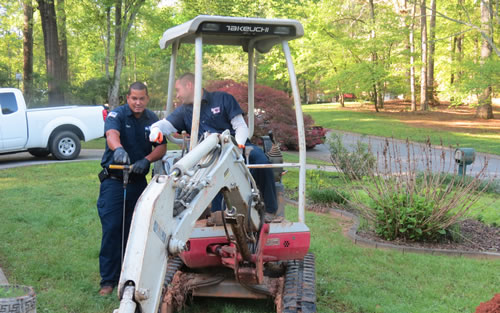Why Do I Have a Failing Septic Tank
Read More
Schedule Online
919-446-4099

May 03, 2023
Many houses and other buildings without a connection to a municipal sewage system must use septic tanks. Household wastewater, which includes everything from toilet waste to shower and sink water, must be gathered, treated, and disposed of by them. Septic tanks, however, can be vulnerable to a number of difficulties that might affect the effectiveness and efficiency of the system.
In this blog post, our septic tank professionals from Septic Blue of Raleigh will discuss the most common septic tank issues and how to address them.
Septic tanks frequently experience problems due to irregular pumping. Regular pumping of septic tanks is necessary to keep sediments from accumulating and blocking the system. Regular tank pumping prevents a variety of issues, such as backups, slow drainage, and unpleasant odors. Depending on the size of the tank and the number of users, homeowners should have their septic tanks pumped every three to five years.
Tree root incursion is a problem that septic tanks frequently encounter. Because of their ability to shoot roots deep into the ground in search of water, trees and bushes have the potential to clog or damage septic tank lines. This may result in clogs, sluggish drains, and in extreme circumstances, septic tank failure. It's crucial to have a professional check your septic tank system for tree root damage if you have blockages or slow discharges.
Septic tank inlet and outflow pipelines may clog with material, such as sediments and grease, over time. Due to this, the tank may backup or overflow, resulting in sewage spills and unpleasant odors. It's crucial to have a professional evaluate the system and remove any obstructions if you feel that your septic tank pipes are clogged.
Another typical problem with septic tanks is soil saturation. The system may not be able to treat and dispose of wastewater correctly if the soil surrounding the tank is wet with water. This may result in blockages, sluggish drains, and unpleasant odors. Heavy rainfall, poor drainage, a high water table, and other conditions can all contribute to soil saturation. It's crucial to have a professional evaluate your septic tank system if you observe any indications of soil saturation.
Age, the environment, and other factors can also cause damage to septic tanks over time. This might result in cracks, leaks, and other problems that would reduce the system's efficiency. It's crucial to have a professional evaluate the system and perform any necessary repairs if you see any damage indications, such as wet areas or unpleasant odors surrounding the tank.
If you're experiencing any of the common septic tank issues mentioned above, it's important to address them promptly to prevent further damage to the system. Here are a few steps you can take:
It's time to have your septic tank drained if it hasn't been in more than three to five years. By clearing out any particles and debris that have accumulated in the tank, backups and slow drains may be avoided.
Schedule expert repairs as soon as you suspect that your septic tank system is broken or clogged. To get your system back up and operating properly, get it inspected, diagnosed, and repaired or replaced as needed by a septic tank repair expert.
Are you in need of a septic tank pumping? Luckily, we at Septic Blue of Raleigh have dedicated workers ready at your service. Contact our representatives for more information.